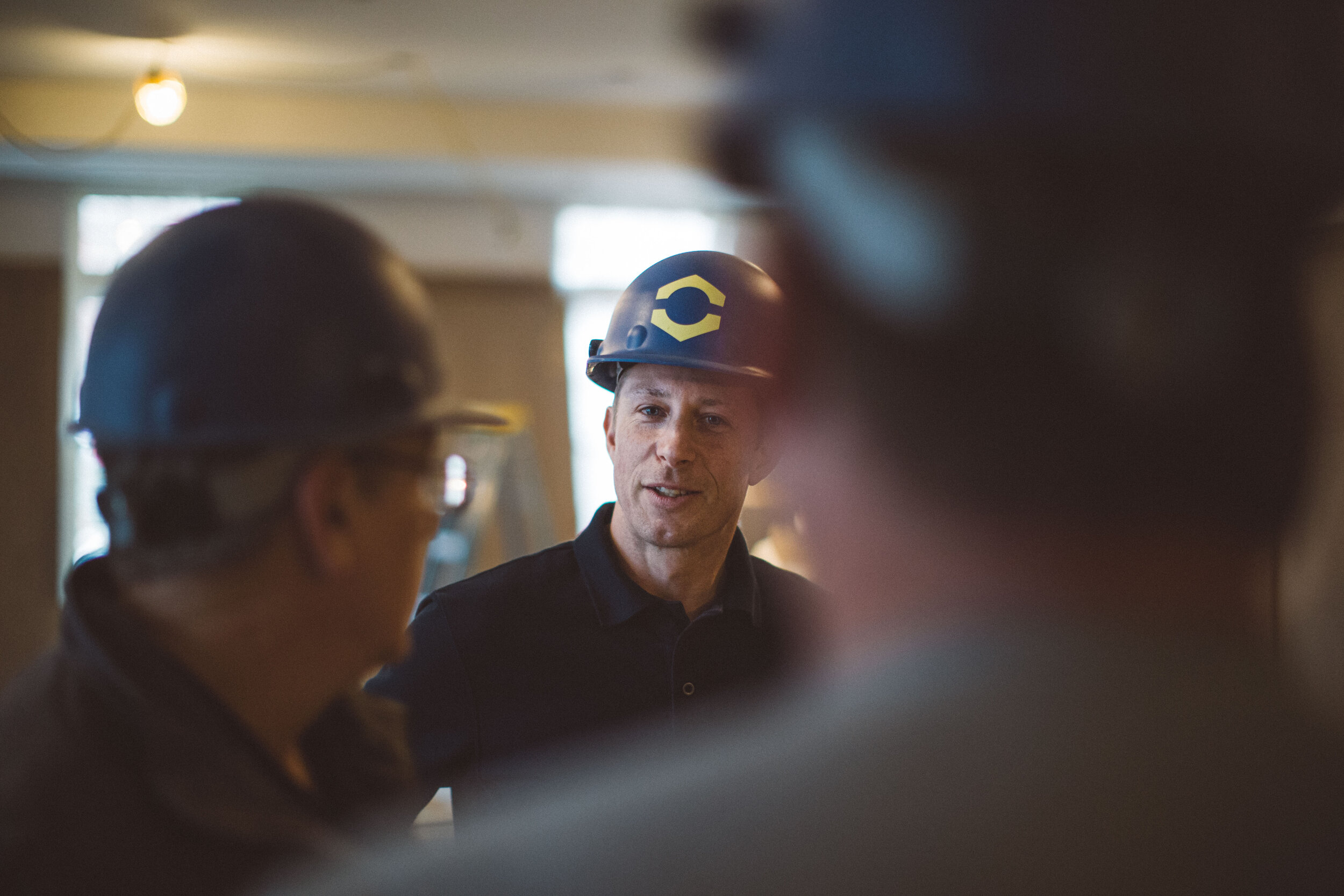Monday Mornings
It’s Monday morning and Marcus Golding is getting, to use his word, “roasted”. It’s Optimum’s weekly team meeting and as a Project Manager, he’s well used to it. “Listen, most of us do something stupid most days and getting roasted keeps our feet on the ground, keeps us humble and keeps us driven. It’s how you know you’re part of the family at Optimum, when you get roasted on a Monday.” Apparently, PLAIN TALK isn’t just a belief on the website!
Speaking of beliefs, it’s stylish these days to have a “Statement Of Values” front and center on a company’s marketing material; to talk about work-culture, have a ping pong table, and tout office camaraderie. But Marcus cuts through all that: “Culture isn’t bullet points on a website. It’s not an email signature. Culture is either lived out or it’s not. Years ago, I was an owner’s rep for clients who had hired Optimum to build their home. I met Kendrick and Ryan and it took just that one project for me to notice that they were already living out the nascent values of their company.” (And yes, Marcus uses words like nascent, which I had to look up, which he’ll no doubt be roasted for when this blog is published.) But back to meeting Kenrick and Ryan, “we built a relationship during that project based on Plain Talk and Shared Success and all the values that have now made it to the website, but started with the owners and team members of the company. I think that’s important.”
That sounds like the roots of company culture, right?
“So how does a culture like that last over time?” I ask this question of Marcus who likely raises a skeptical eyebrow on the other end of the phone call… “this interview is getting a bit starry-eyed isn’t it?” But he indulges me, and wisely begins to talk about conflict. When it comes to values, conflict is where the proverbial rubber meets the road. When words on a page have to get up and go to work. You really don’t know what you value until it costs you.
“When there’s conflict, and yes, there is conflict. Whether that’s among subcontractors or even within the team, Kendrick and Ryan support us each individually, which is important. But even more importantly, they default to placing the team goal over any one ego. We just know that’s how it plays out.” The same is true of problem-solving: “No matter what, the construction business is just barely organized chaos, and stuff goes wrong every. Single. Day. But the question that’s asked around problems is not, ‘whose fault is this?’ but rather ‘how will we solve this?’ which does away with so much pointless finger-pointing and moves us forward instead.”
It’s been a few years since Marcus was day-to-day on the jobsite. He pokes fun at his managerial role by saying that, “these days, hiring me is like losing two good men.” But as we speak to one another, it’s clear that the same characteristics that defined Marcus as a trusted craftsman and contractor are what make him trustworthy in his office chair today.
“I collect my check from Optimum, yes, but I still have an Owner’s Rep hat on when dealing with clients.” Marcus goes on, “At jobs in the past, I’ve seen projects that came in On-Time and On-Budget (success! right?), but the process was miserable for both company and client. It totally soured the job.” Relationship comes first. By first representing the client’s interests and by keeping open lines of communication, Optimum goes beyond the standard metric of success. “Each client is a potential future client. That’s how I look at it.” That means day-to-day Marcus is less-so completing a product than he is building a relationship of trust.
Trust. Big word. Statement-of-Values-Word. But what does it mean? What does it look like when it goes walking?
“CoConstruct, that’s what the program is called.” In Marcus’ world: Trust = CoConstruct. “Basically it’s a real-time warehouse of project information where anyone from myself, to the super, to the client can see specs, costs, and any other relevant project info.” All communication happens within the app, so there’s no mystery as to exactly how many feet of tile at what price the client is getting. As an added bonus, all communication is stored so that decisions made 5 weeks ago don’t require another round of back and forth emails.
Sounds like a powerful tool. But a tool is only as good as the person using it, right? It does no good to have a $1000 bat, but a $10 swing. Marcus agrees, “I’m 53 years old. I’m older than most of these guys. I’ve worked with Project Management softwares that are basically just huge databases; garbage in, garbage out. Companies that aspire to track things and be trustworthy, but that’s it, just an aspiration. This is different”.
Our conversation is winding down. I ask about COVID-19, about how the business has been forced to adapt. Marcus tells me that things have certainly shifted; urban flight is ramping up the Custom Home Building market fast, but he believes Optimum is well-positioned to answer the rising demand. “The same things that make us good at commercial work will help us thrive in residential too. And that is clear comms, solid work, and relationship.”
And so we are back where we started: it’s Monday morning and Marcus is getting roasted. At another company, at another time, this could be a pretty crappy start to the week. But it’s all good here. Great even. Like PLAIN TALK, relationship isn’t just a pearly value for the Optimum website. It’s not just a selling-point.




